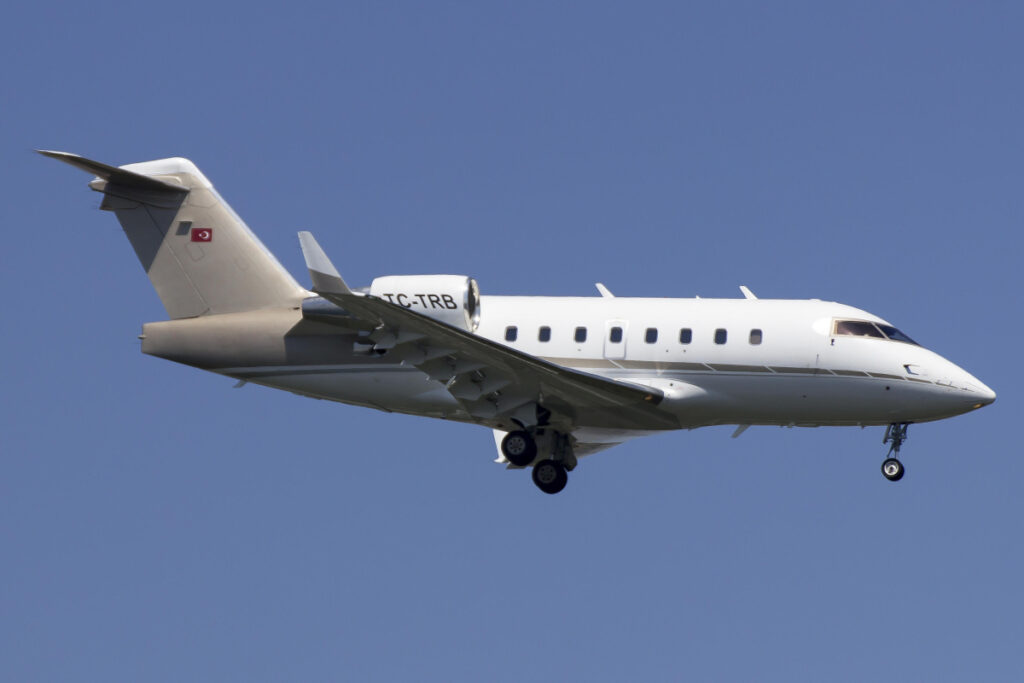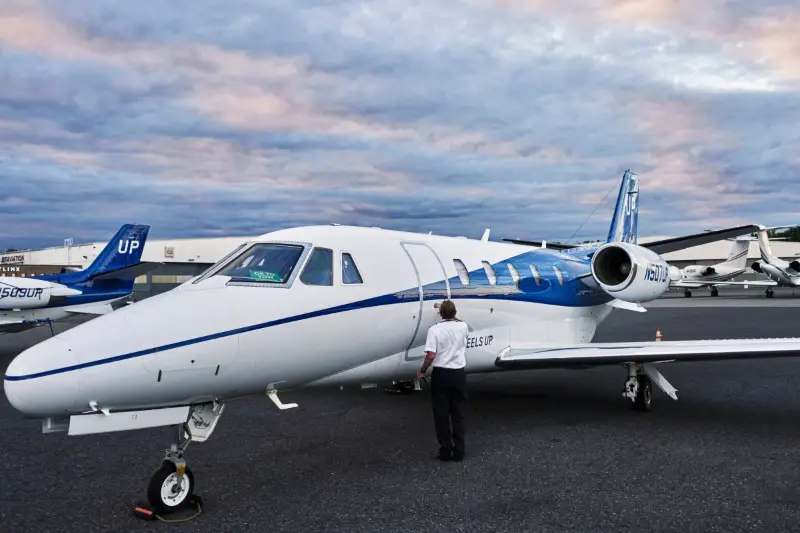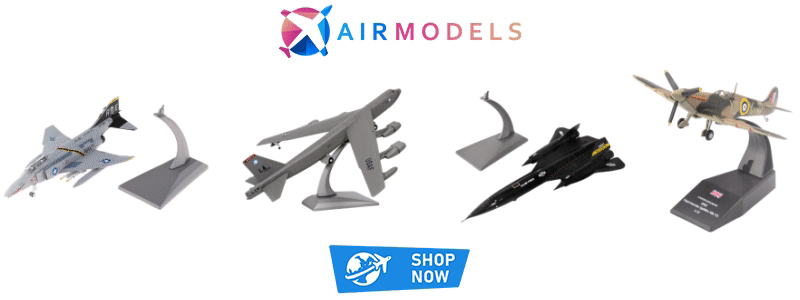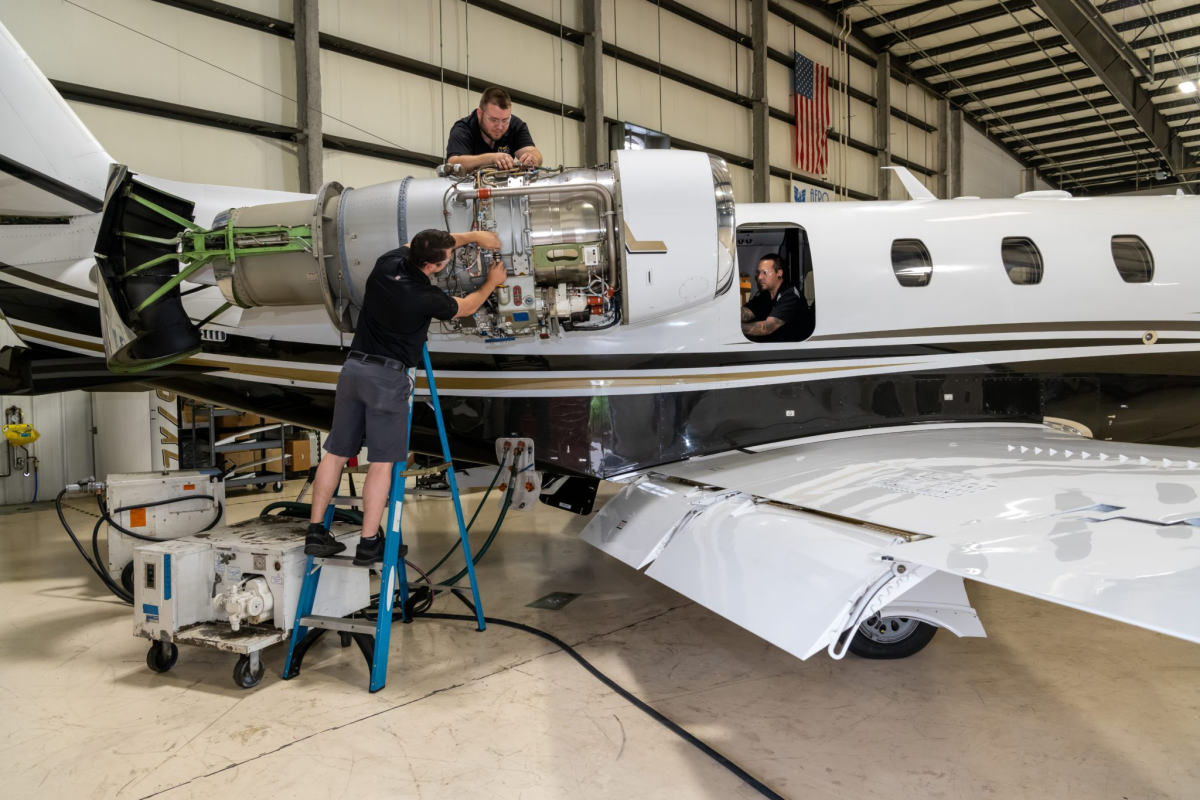How to own a private jet? Owning a private jet is the ultimate symbol of luxury and status. While it may seem like an unattainable dream for many, it is indeed a reality for a select few.
How to own a private jet? To own a private jet, purchase one through a manufacturer or broker, secure financing if necessary, maintain it, and comply with aviation regulations, including pilot licensing and operational expenses.
Contents
If you’ve ever wondered what it takes to own your very own private jet, look no further. Private aviation offers unparalleled freedom and convenience.
Imagine being able to travel on your own terms, avoiding crowded airports and long security lines.
With a private jet at your disposal, you can fly directly to your desired destinations, saving both time and hassle.
In the following sections, we will delve into the world of private aviation, exploring the benefits of owning a private jet and providing you with practical advice on how to navigate the process.
So buckle up as we embark on this exciting journey towards making your private jet ownership aspirations a reality.

How To Own A Private jet? Factors to Consider Before Purchasing a Private Jet
Before diving into the world of private jet ownership, it’s important to consider the financial aspects.
Owning a private jet involves more than just the initial purchase cost. Here are some key financial factors to keep in mind:
- Upfront Costs: Purchasing a new private jet can be quite expensive, with prices ranging from millions to tens of millions of dollars. However, there is also the option of buying a used aircraft, which may offer significant cost savings.
- Maintenance Expenses: Maintaining a private jet requires regular inspections, servicing, and repairs. These costs can add up over time and should be factored into your budget.
- Operating Costs: In addition to maintenance expenses, there are ongoing operating costs such as fuel, insurance, hangar fees, and pilot salaries. These expenses can vary depending on the size and type of aircraft.
While owning a private jet offers convenience and luxury, it’s crucial to have a clear understanding of the financial commitment involved.
Determine Your Travel Needs
Another important factor to consider before purchasing a private jet is your travel needs.
Assessing your requirements will help you choose an aircraft that aligns with how you plan to use it. Consider the following:
- Distance: How far do you typically need to travel? If you frequently fly long distances, you’ll need an aircraft with sufficient range capabilities.
- Frequency: How often do you plan on using your private jet? If you fly frequently throughout the year, it may be more cost-effective to own rather than charter.
- Destinations: Where do you most often travel? Some jets are better suited for short-haul flights within one region while others are designed for intercontinental journeys.
Understanding your travel needs will enable you to select an aircraft that meets your specific requirements.
Understand Different Types of Private Jets
The market offers a wide variety of private jets, each with its own unique features and capabilities. Familiarize yourself with the different types to make an informed decision:
- Light Jets: These smaller aircraft are ideal for short trips and can typically accommodate up to six passengers.
- Midsize Jets: Offering more space and range than light jets, midsize jets are suitable for both short and medium-haul flights.
- Large Cabin Jets: If you require ample seating capacity, larger cabins, and enhanced amenities, large cabin jets are the way to go.
- Ultra-Long Range Jets: Designed for intercontinental travel, these jets offer extended range capabilities and luxurious interiors.
By understanding the various types of private jets available, you can choose one that best suits your needs and preferences.
Consider Logistical Aspects
In addition to financial considerations and travel needs assessment, it’s essential to consider the logistical aspects of owning a private jet:
- Hangar Space: Do you have access to hangar space for storing your aircraft? Renting or purchasing hangar space is necessary to protect your investment from weather conditions and potential damage.
- Crew Requirements: Depending on the size of your aircraft, you may need a crew consisting of pilots, flight attendants, or maintenance personnel. Consider whether you will hire full-time staff or contract out these services.
Taking into account these logistical factors will ensure a smooth ownership experience and help avoid any unnecessary complications down the line.

Step-by-Step Guide on Buying a Private Jet
To start your journey towards owning a private jet, the first step is to research reputable aircraft brokers or dealers.
These professionals have the knowledge and experience to guide you through the purchasing process.
They can help you find the right aircraft that fits your budget and requirements.
Here are some key points to consider when researching aircraft brokers:
- Look for brokers with a good reputation and positive reviews from previous clients.
- Check if they have experience in dealing with the specific type of aircraft you are interested in.
- Consider their expertise in negotiating prices and financing options.
Assess the condition and history of potential aircraft
Once you have found potential private jets that catch your interest, it’s crucial to assess their condition and history.
This step will ensure that you make an informed decision before making a purchase.
Here’s what you need to do:
- Arrange for inspections: Hire a qualified aviation mechanic or inspector to thoroughly examine the aircraft. They will check for any mechanical issues, structural damage, or maintenance concerns.
- Review records: Obtain all relevant documentation regarding the aircraft’s maintenance history, repairs, and modifications. This information will give you insights into how well-maintained the jet has been over time.
- Consider previous ownership: Find out who previously owned the jet and how it was used. Knowing this information can help identify any potential risks associated with its past usage.
Negotiate price, financing options, and warranty agreements
Negotiation plays a significant role in getting the best deal possible. Here are some tips for successful negotiations:
- Establish your budget: Determine how much you are willing to spend on both buying and maintaining the jet.
- Research market prices: Compare prices of similar models currently available on the market.
- Seek expert advice: Consult with experienced aviation professionals who can provide guidance on fair pricing.
- Explore financing options: Consider different financing options such as loans or leasing agreements to make the purchase more affordable.
- Discuss warranty agreements: Negotiate warranty coverage to protect yourself from unexpected repairs or damages.
Complete necessary paperwork
Once you have negotiated and agreed upon a price, it’s time to complete the necessary paperwork to finalize the purchase.
This step involves several important tasks:
- Register the aircraft: File the appropriate registration documents with the aviation authority in your country.
- Obtain insurance coverage: Secure comprehensive insurance coverage for your private jet to protect against potential risks.
- Fulfill tax obligations: Understand and comply with any tax obligations associated with owning a private jet in your jurisdiction.
Remember, buying a private jet is a significant investment that requires careful planning and consideration.
By following these steps and seeking professional advice, you can navigate through the purchasing process smoothly and confidently.

Benefits of Owning a Private Jet
Owning a private jet comes with a multitude of benefits that make it an attractive option for those seeking convenience and pleasure in their travel experiences.
Let’s explore some of the key advantages:
Time-saving convenience with flexible scheduling options
When you own a private jet, you have the freedom to create your own flight schedule. Say goodbye to long waits at commercial airports and rigid departure times.
With your own aircraft, you can fly whenever it suits you best.
This flexibility allows you to save valuable time and avoid the hassle of dealing with crowded terminals and lengthy security procedures.
Enhanced privacy and security during travel
Privacy is paramount. You can enjoy the luxury of traveling without prying eyes or unwanted attention from fellow passengers.
Whether you’re a high-profile individual or simply value your personal space, having your own aircraft ensures complete confidentiality during your journey.
Moreover, private jets offer heightened security measures compared to commercial flights.
From rigorous background checks for all personnel involved in your travel arrangements to restricted access to the aircraft itself.
Owning a private jet provides peace of mind knowing that your safety is prioritized.
Access to remote locations not served by commercial airlines
One of the most significant advantages of owning a private jet is the ability to reach remote destinations that are not conveniently served by commercial airlines.
Whether it’s visiting exotic islands or accessing secluded mountain resorts, having your own aircraft opens up a world of possibilities for exploration and adventure.
No longer bound by airline routes or limited flight schedules, you can easily fly directly to these exclusive locations without any layovers or connections.
This level of accessibility allows you to experience unique destinations on your terms.
Increased productivity while onboard with personalized amenities
Imagine turning your travel time into productive moments rather than wasted hours. When you own a private jet, this becomes a reality.
These luxurious aircraft are equipped with state-of-the-art amenities and customized interiors, providing you with a comfortable and conducive environment to work or relax.
You can set up your workspace, hold meetings, or catch up on important tasks while cruising at high altitudes.
With access to Wi-Fi, spacious seating arrangements, and personalized services, owning a private jet enables you to make the most of your time in the air.

Leasing vs Buying: Making the Right Choice
Leasing and buying are two options to consider.
Each option has its own advantages and considerations, so it’s important to make an informed decision that aligns with your financial goals and usage patterns.
Leasing offers flexibility without long-term commitment or ownership responsibilities.
Leasing a private jet allows you to enjoy the benefits of flying privately without the long-term commitment or ownership responsibilities. Here are some key points to consider:
- Flexibility: Leasing gives you the flexibility to choose different jets based on your needs, allowing you to upgrade or downgrade as necessary.
- Upfront cost: Leasing typically requires a lower upfront cost compared to buying, making it more accessible for those who don’t want to make a large investment upfront.
- Maintenance and repairs: With leasing, the responsibility for maintenance and repairs often falls on the lessor, relieving you of additional costs and headaches.
Buying provides long-term cost savings if you frequently use private jets.
If you frequently use private jets, buying might be a better option for you in the long run. Here’s why:
- Cost savings: Owning a private jet can provide long-term cost savings if you fly frequently. Instead of paying for each flight individually, owning allows you to amortize costs over time.
- Personalization: When you own a private jet, you have complete control over its customization and design according to your preferences.
- Investment potential: Private jets can hold their value well over time, making them potential investments that can appreciate in value.
Determine which option aligns better with your financial goals and usage patterns.
To make an informed decision between leasing and buying a private jet, consider these factors:
- Financial goals: Evaluate your financial situation and determine whether leasing or buying aligns better with your overall financial goals.
- Usage patterns: Assess how frequently you plan on using the private jet and whether it makes more sense to lease or buy based on your usage patterns.
Evaluate tax implications associated with leasing or buying.
Tax considerations play a significant role in the decision-making process. Here are some points to keep in mind:
- Tax deductions: Both leasing and buying can offer tax advantages, but the specific deductions vary. Consult with a tax professional to understand the tax implications of each option.
- Sales tax: When buying a private jet, you may be subject to sales tax depending on your location. Leasing, on the other hand, may have different tax structures.

Registering and Managing Your Private Jet
To own a private jet, it’s essential to understand the process of registering and managing your aircraft. Here are some key points to keep in mind:
Familiarize yourself with international regulations for aircraft registration process.
Before you can take to the skies in your own private jet, you need to go through the registration process.
This involves complying with international aviation laws and regulations. It’s crucial to familiarize yourself with these rules to ensure a smooth and legal registration process.
Hiring an aviation lawyer or consultant can be beneficial in navigating through these complex regulations.
Hire professionals experienced in managing aviation assets to handle administrative tasks effectively.
Managing a private jet involves various administrative tasks that require expertise and experience.
To streamline operations, it’s wise to hire professionals who specialize in managing aviation assets.
These experts can handle tasks such as insurance, maintenance scheduling, crew management, and financial administration efficiently.
Maintain compliance with safety standards through regular inspections and maintenance checks.
Safety should always be a top priority when owning a private jet. Regular inspections and maintenance checks are essential for ensuring that your aircraft is in optimal condition.
Engage qualified technicians who can conduct thorough inspections of the plane’s systems, engines, avionics, and overall structure.
By adhering to strict safety standards, you can minimize risks during flights.
Manage flight operations efficiently by coordinating crew schedules, fueling logistics, etc.
Efficiently managing flight operations is crucial for a seamless travel experience on your private jet. This includes coordinating crew schedules, arranging fueling logistics at airports.
Planning flight routes based on weather conditions, and handling any necessary paperwork related to customs or immigration procedures.
Employing experienced flight managers or using professional aviation management services can help streamline these processes effectively.
Owning a private jet comes with many benefits but also requires careful attention to detail.
By following international regulations for registration, hiring professionals experienced in aviation asset management, maintaining safety standards through regular inspections.
And efficiently coordinating flight operations, you can ensure a smooth and enjoyable experience when flying on your own private jet.

Choosing the Perfect Aircraft Management Company
To own a private jet, it’s crucial to choose the right aircraft management company that can handle all your needs. Here are some tips to help you make an informed decision:
Conduct Thorough Research on Reputable Aircraft Management Companies
Before making any commitments, take the time to research and gather information about different aircraft management companies.
Look for ones that have a solid reputation in the industry and are known for their professionalism and reliability.
Consider Their Experience, Track Record, and Client Testimonials
Experience matters. Look for companies that have been in the business for several years and have a proven track record of successfully managing aircraft.
Reading client testimonials or reviews can give you insights into their level of customer satisfaction.
Evaluate the Range of Services Offered
Aircraft management companies offer various services beyond just managing your jet.
Take into consideration what services they provide, such as maintenance, crew management, and charter operations.
Having these additional services available can greatly simplify your ownership experience.
Assess Their Financial Stability and Transparency in Financial Reporting
It’s important to ensure that the aircraft management company you choose is financially stable.
This will give you peace of mind knowing that they can effectively manage your financial affairs related to your private jet.
Transparency in financial reporting is crucial so that you have clear visibility into how your funds are being managed.
When researching potential companies, consider the following factors:
- Look at their financial statements or reports if available.
- Check if they provide regular updates on expenses and revenue related to your aircraft.
- Inquire about their insurance coverage for your jet.
By evaluating these aspects, you can gauge whether an aircraft management company is financially sound and trustworthy.
Choosing the right aircraft management company is essential for a smooth ownership experience with your private jet.
Take the time to thoroughly research different options before making a decision.
Remember to consider their experience, track record, and client testimonials.
Evaluate the range of services they offer and assess their financial stability and transparency in financial reporting.

Your Path to Private Jet Ownership
To own a private jet, there are several important steps you need to follow.
Let’s dive into the details and explore how you can make your dream of owning a private jet a reality.
Set a Realistic Budget
The first step in owning a private jet is setting a realistic budget. Consider not only the purchase price of the aircraft but also the operating costs involved.
These costs include fuel, maintenance, insurance, and hiring qualified crew members.
It’s essential to have a clear understanding of your financial capabilities before proceeding further.
Consult with Aviation Experts
Consulting with aviation experts is crucial.
These professionals have in-depth knowledge about different types of private jets and can guide you based on factors such as range, cabin size, and performance capabilities.
Their expertise will ensure that you make an informed decision that aligns with your needs.
Create a Comprehensive Ownership Plan
Creating a comprehensive ownership plan is vital to ensure smooth sailing throughout the process.
This plan should consider financing options and tax implications associated with aircraft ownership.
Seek advice from financial advisors who specialize in private aviation solutions to help you structure your ownership plan effectively.
Follow a Step-by-Step Guide
Navigating through the buying process smoothly requires following a step-by-step guide. Here are some key steps to consider:
- Research: Gather information about different aircraft models, their features, and market prices.
- Pre-purchase Inspection: Hire an experienced aviation technician to conduct a thorough inspection of any used aircraft you’re considering.
- Financing Options: Explore various financing options available for purchasing your private jet.
- Legal Matters: Engage legal professionals familiar with aircraft transactions to handle paperwork and ensure compliance with regulations.
- Insurance: Obtain comprehensive insurance coverage for your aircraft.
- Crew Selection: Assemble an experienced crew comprising pilots and cabin attendants who meet your specific requirements.
Enjoy the Benefits of Ownership
Once you’ve successfully completed the buying process, you can start enjoying the benefits of private jet ownership. Here are some advantages:
- Flexibility: With your own private jet, you have the freedom to travel whenever and wherever you want without relying on commercial airline schedules.
- Comfort and Privacy: Private jets offer luxurious cabins where you can relax or work in privacy during your flights.
- Efficiency: Private jets allow for direct flights to smaller airports, saving time and reducing travel hassle.
- Customization: As an owner, you have the freedom to customize your aircraft’s interior according to your preferences.
Owning a private jet is an exciting venture that requires careful planning and consideration.
By setting a realistic budget, consulting with experts, creating a comprehensive ownership plan, and following a step-by-step guide.
You’ll be well on your way to experiencing the luxury and convenience of private jet travel.

Conclusion
In conclusion, owning a private jet can be an exciting and rewarding experience for those who have carefully considered all the factors involved.
This comprehensive guide has provided valuable insights into the various aspects of private jet ownership.
From the initial considerations to the registration and management of your aircraft.
By following this step-by-step guide, potential buyers can make informed decisions and navigate through the complexities of purchasing their own private jet.
If you’re serious about owning a private jet, it is crucial to consult with aviation experts and professionals who specialize in aircraft management.
They can provide personalized advice tailored to your specific needs and preferences. Conducting thorough research on different models.
Considering financial implications, and understanding operational costs will ensure that you are well-prepared for this significant investment.
FAQs
1. How much does it cost to buy a private jet?
The cost of buying a private jet varies depending on several factors such as the model, age, condition, and additional features. Prices typically range from several million dollars to tens of millions.
2. What are the ongoing expenses associated with owning a private jet?
Ongoing expenses include maintenance costs, fuel expenses, insurance premiums, hangar fees or parking charges at airports, crew salaries (if applicable), and regular inspections.
3. Can I finance the purchase of a private jet?
Yes, financing options are available for purchasing a private jet. Many financial institutions offer loans specifically designed for aircraft acquisitions.
4. Do I need a pilot’s license to own a private jet?
While it is not mandatory for owners to hold a pilot’s license themselves if they hire professional pilots to operate their aircraft; however, having some knowledge of aviation regulations and procedures is beneficial.
5. Are there any tax benefits associated with owning a private jet?
Tax laws vary by jurisdiction; therefore consulting with tax professionals is essential as they can provide guidance on potential tax benefits or deductions related to private jet ownership.







Leave a Reply